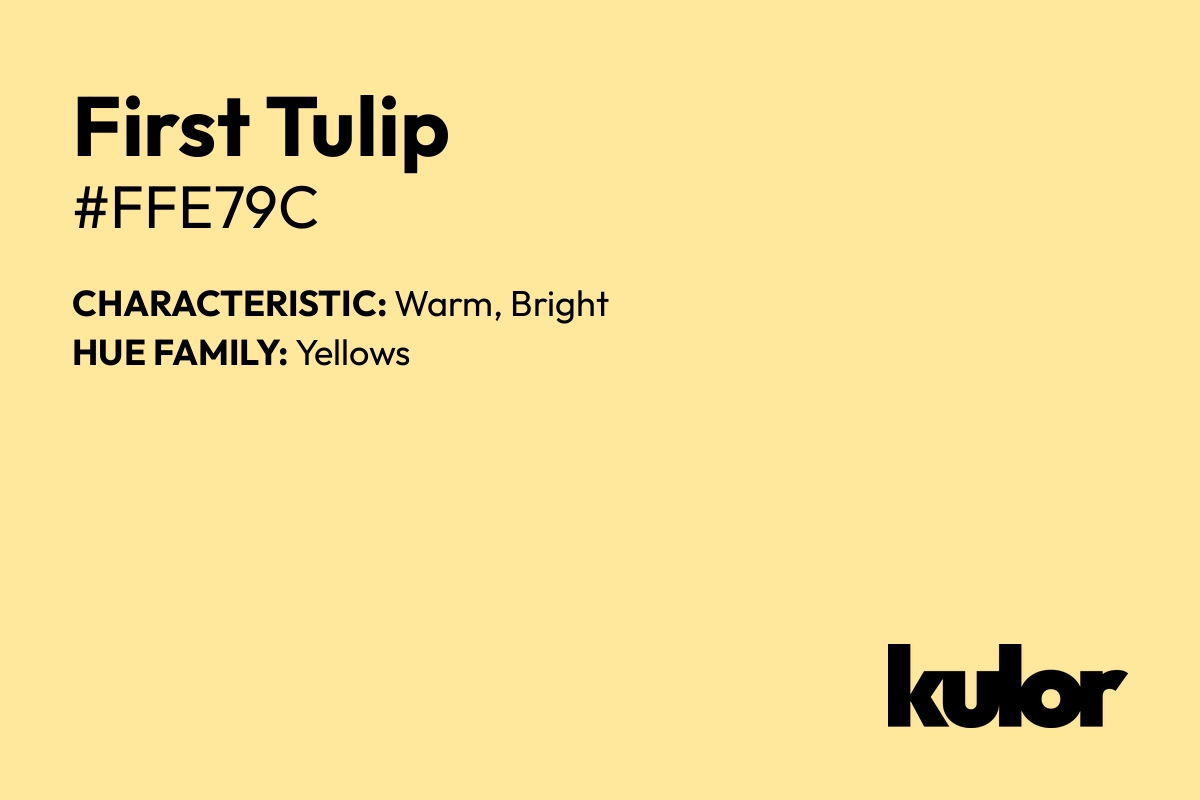Color First Tulip yellow-orange (#ffe79c):
HEX, RGB color codes for HTML and CSS
The Comprehensive Guide to First Tulip yellow-orange (#ffe79c):
Its Meaning and Harmonious Color Matches in Design.

Hue Family:
yellow-oranges
yellow-oranges Family:
light-vibrant
Saturation:
moderately saturated
Tones:
light-toned
Shade:
light
Temperature:
warm
Chromaticity:
chromatic
Chroma:
medium chroma
Color Information about First Tulip / #ffe79c
The HTML HEX code is #ffe79c. The corresponding color name is "First Tulip". In RGB values (additive color space used for Digital Displays), this HEX code translates to Red (R): 255%, Green (G): 231%, Blue (B): 156%. In the CMYK color model (subtractive color model used in printing), it is represented by Cyan (C): 0%, Magenta (M): 9%, Yellow (Y):39%, Black (K): 0%. In the HSL color space, #ffe79c has a hue of 45°, saturation of 100%, and lightness of 81%. The HSV representation is 45° for hue, 39% for saturation, and 100% for value.
In the CIE-LAB color space, the color is denoted by L* (lightness) = 92, a* (green to red) = -2, and b* (blue to yellow) = 39. The XYZ representation is X: 76, Y: 81, Z: 43. In the YUV color space, it translates to Y (luminance) = 0.9005, U (chrominance) = -0.1421, and V (chrominance) = 0.0873.
The decimal value of the color is 16770972. The closest Web-safe HEX code is #FFFF99. Variations of the colour are #FFFFFF for a 20% lighter version and #FFCD38 for a 20% darker version.
For the color with hex value #ffe79c, the correlated color temperature (CT) is estimated to be 4197 Kelvin (4197K).
The approximate wavelength of #ffe79c is around 610.00nm.
| VALUE | CSS | |
|---|---|---|
| HEX Code | ffe79c | #ffe79c |
| RGB Decimal Code | 255, 231, 156 | rgb(255, 231, 156) |
| CMYK | 0, 9, 39, 0 | / |
| HSL | 45°, 100%, 81% | hsl(45°, 100%, 81%) |
| HSV | 45°, 39%, 100% | / |
| CIE-LAB | 92, -2, 39 | / |
| XYZ | 76, 81, 43 | / |
| YUV | 0.9005, -0.1421, 0.0873 | / |
| Decimal value | 16770972 | / |
| Web-Safe HEX | FFFF99 | #FFFF99 |
| Color Temperature (CT) | 4197 Kelvin (4197K) | / |
| Estimate Wavelength | around 610.00nm | / |
The Depth and Diversity of First Tulip (Hex: #ffe79c): Exploring its Impact in Design and Culture
The hex color #ffe79c, named First Tulip, resembles the warm and inviting hues found in a field of blooming sunflowers. This vibrant shade brings to mind the golden petals and honey-like glow of these iconic flowers. When used in design or imagery, First Tulip evokes a sense of joy, happiness, and the beauty of nature. It is reminiscent of a radiant sunset, casting a warm and comforting light on the world. Just like a sunflower field, First Tulip can brighten any space and create a cheerful and optimistic atmosphere.
Download Stunning First Tulip Wallpapers and Backgrounds
Enhance your devices with our minimalistic yet captivating First Tulip Wallpapers, perfectly designed for 4K, 5K, iPhone, and Android screens. Experience a unique aesthetic that brings elegance to your digital life.
Experience Elegance with First Tulip 4K Wallpaper
Immerse yourself in the beauty of our First Tulip 4K Wallpaper, offering a resolution of 3840px by 2160px. Perfect for high-resolution displays, this wallpaper brings a touch of sophistication to your desktop.
Download First Tulip 4K WallpaperTints and Shades of #ffe79c HEX color (First Tulip)
In color theory, tints and shades are essential for understanding the depth and luminosity of colors. A tint is achieved by adding white to a pure hue, lightening its appearance. Conversely, a shade results from blending black with a color, giving it a deeper tone. In the context of #ffe79c, this color stands at the center between its tints and shades. While the tints get progressively lighter moving towards white (#ffffff), the shades deepen towards black (#000000).
- #ffffff
- #FFF9E6
- #FFF3CE
- #FFEDB5
- #ffe79c
- #BFAD75
- #80744E
- #403A27
- #000000
Tones of First Tulip (#ffe79c HEX color)
A tone is produced by adding gray to any pure hue. In the case of #ffe79c, #ccbe91 is the less saturated color, while #ffe79c is the most saturated one.
- #ccbe91
- #d9c894
- #e6d296
- #f2dd99
- #ffe79c
- #af9133
- #b79426
- #bf971a
- #c79a0d
HTML Usage Examples
HTML using color code example
<p style="color: #ffe79c;">This is a css example</p>HTML / CSS Color Name using W3C
W3C HTML / CSS Color Name doesn't exist for #ffe79c.
CSS color code example
p { color: #ffe79c; }Text with hexadecimal color #ffe79c
This is a sample text with color #ffe79c.
Background Color with #ffe79c
This is a example with background color #ffe79c.
Border Color with #ffe79c
#ffe79c Color Preview on White (#ffffff) Background
This is a example of text with color #ffe79c on white background.
#ffe79c Color Preview on Black (#000000) Background
This is a example of text with color #ffe79c on black background.
CSS codes examples
.text {color:#ffe79c;}.background {background-color:#ffe79c;}.border {border:1px solid #ffe79c;}